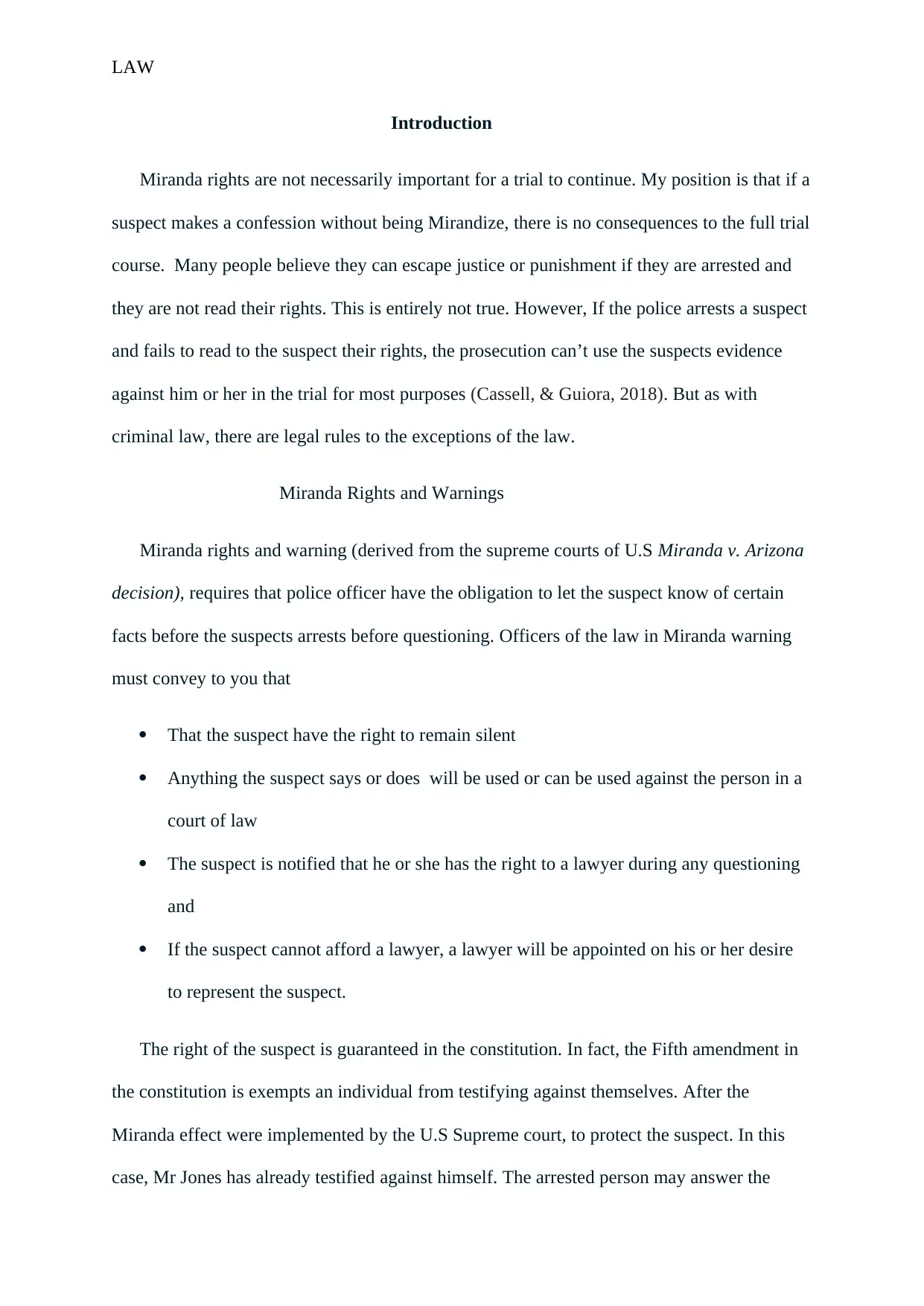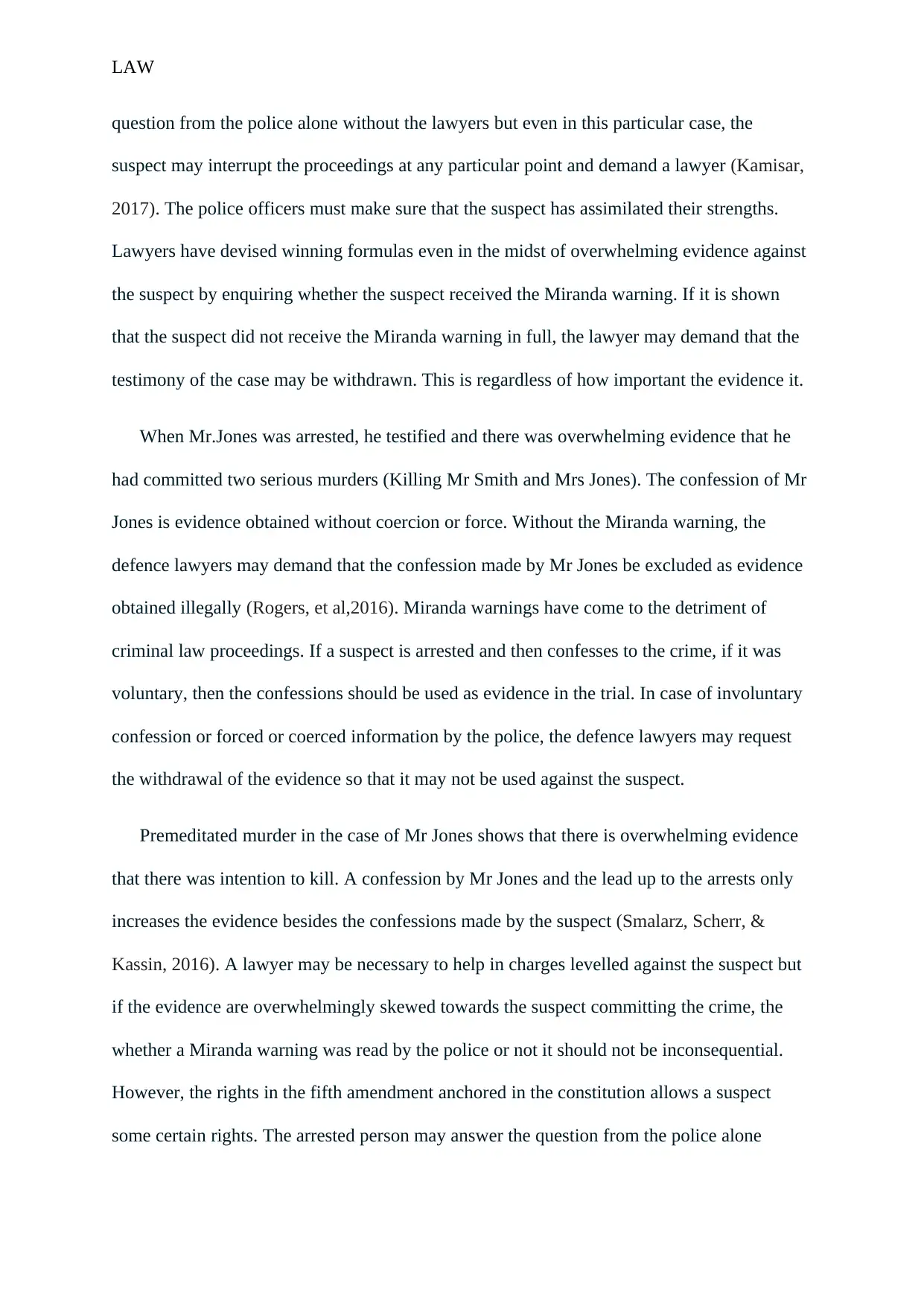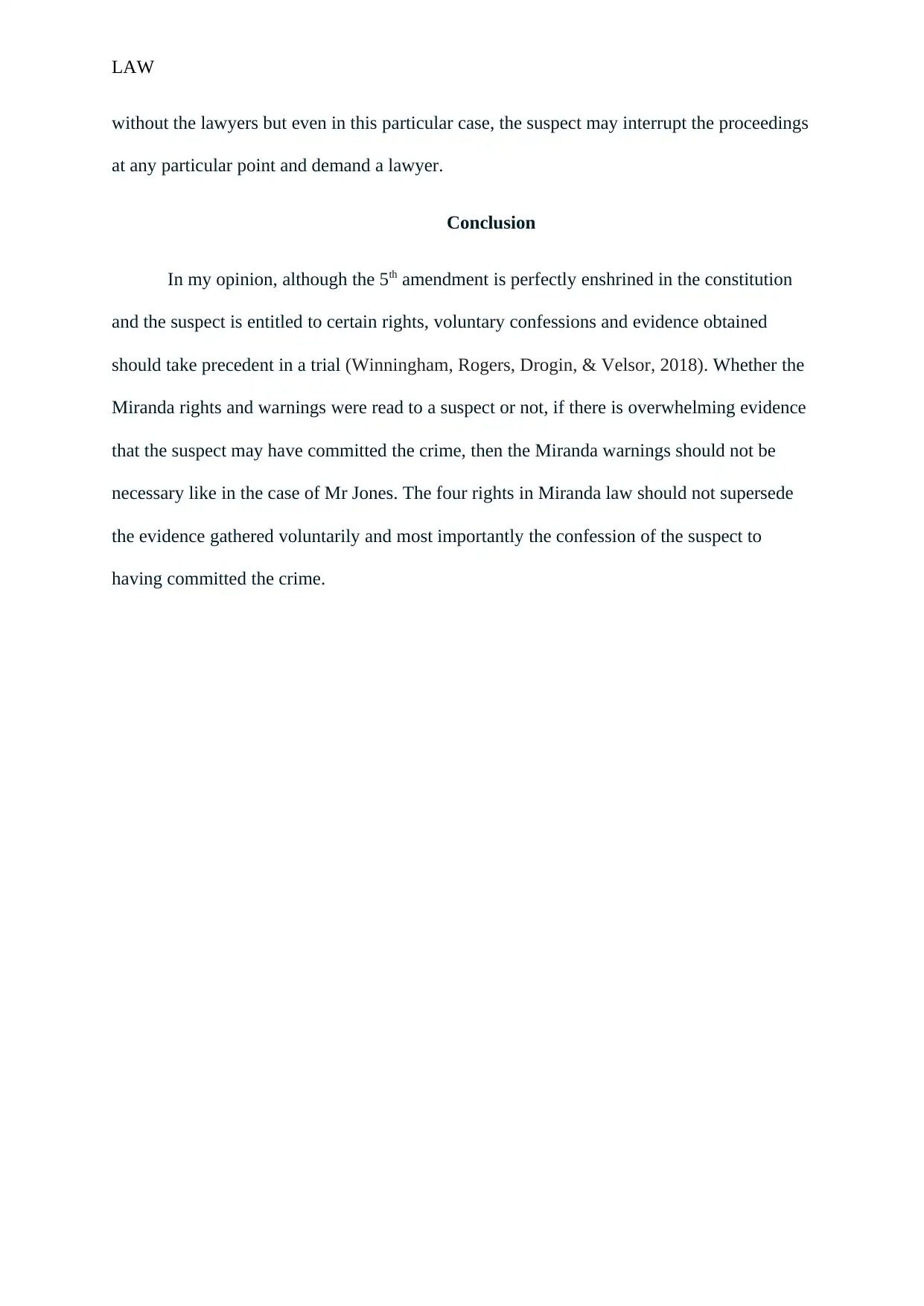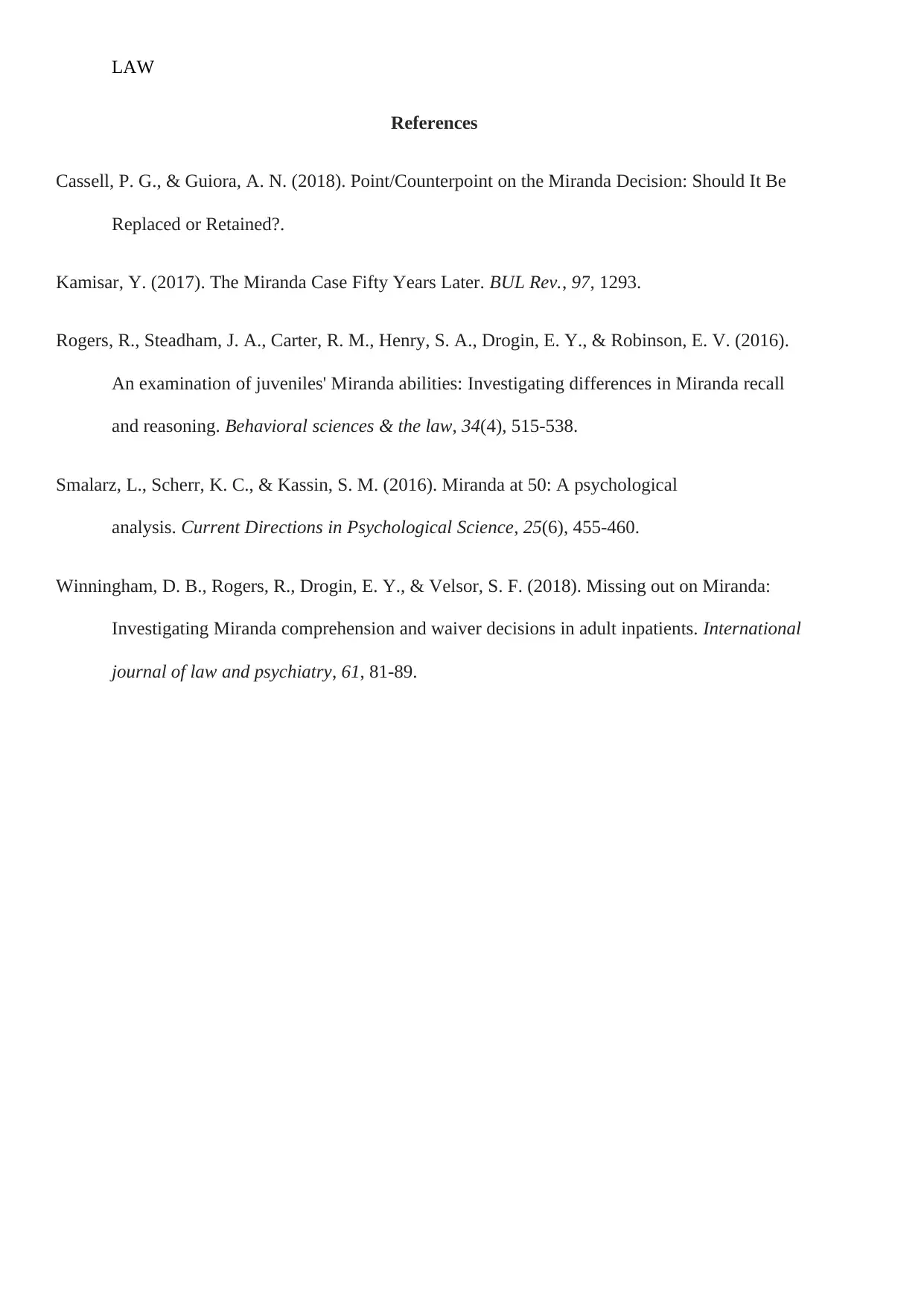Miranda Rights and Their Impact on the Admissibility of Evidence
VerifiedAdded on 2022/10/31
|5
|1070
|449
Essay
AI Summary
This essay explores the significance of Miranda rights in the context of criminal trials, arguing that while the Fifth Amendment ensures certain rights to suspects, voluntary confessions and overwhelming evidence should take precedence. The essay uses the hypothetical case of Mr. Jones to illustrate how a suspect's confession, even without being Mirandized, can be crucial evidence, especially when supported by other evidence. It discusses the potential for defense lawyers to challenge the admissibility of evidence obtained without a Miranda warning, but ultimately concludes that if there is substantial evidence of guilt, the absence of a Miranda warning should not invalidate the trial. The essay references relevant legal cases and scholarly articles to support its arguments, emphasizing the balance between protecting individual rights and ensuring justice.

Running head: LAW
Law
Name:
Institution:
Date:
Law
Name:
Institution:
Date:
Paraphrase This Document
Need a fresh take? Get an instant paraphrase of this document with our AI Paraphraser

LAW
Introduction
Miranda rights are not necessarily important for a trial to continue. My position is that if a
suspect makes a confession without being Mirandize, there is no consequences to the full trial
course. Many people believe they can escape justice or punishment if they are arrested and
they are not read their rights. This is entirely not true. However, If the police arrests a suspect
and fails to read to the suspect their rights, the prosecution can’t use the suspects evidence
against him or her in the trial for most purposes (Cassell, & Guiora, 2018). But as with
criminal law, there are legal rules to the exceptions of the law.
Miranda Rights and Warnings
Miranda rights and warning (derived from the supreme courts of U.S Miranda v. Arizona
decision), requires that police officer have the obligation to let the suspect know of certain
facts before the suspects arrests before questioning. Officers of the law in Miranda warning
must convey to you that
That the suspect have the right to remain silent
Anything the suspect says or does will be used or can be used against the person in a
court of law
The suspect is notified that he or she has the right to a lawyer during any questioning
and
If the suspect cannot afford a lawyer, a lawyer will be appointed on his or her desire
to represent the suspect.
The right of the suspect is guaranteed in the constitution. In fact, the Fifth amendment in
the constitution is exempts an individual from testifying against themselves. After the
Miranda effect were implemented by the U.S Supreme court, to protect the suspect. In this
case, Mr Jones has already testified against himself. The arrested person may answer the
Introduction
Miranda rights are not necessarily important for a trial to continue. My position is that if a
suspect makes a confession without being Mirandize, there is no consequences to the full trial
course. Many people believe they can escape justice or punishment if they are arrested and
they are not read their rights. This is entirely not true. However, If the police arrests a suspect
and fails to read to the suspect their rights, the prosecution can’t use the suspects evidence
against him or her in the trial for most purposes (Cassell, & Guiora, 2018). But as with
criminal law, there are legal rules to the exceptions of the law.
Miranda Rights and Warnings
Miranda rights and warning (derived from the supreme courts of U.S Miranda v. Arizona
decision), requires that police officer have the obligation to let the suspect know of certain
facts before the suspects arrests before questioning. Officers of the law in Miranda warning
must convey to you that
That the suspect have the right to remain silent
Anything the suspect says or does will be used or can be used against the person in a
court of law
The suspect is notified that he or she has the right to a lawyer during any questioning
and
If the suspect cannot afford a lawyer, a lawyer will be appointed on his or her desire
to represent the suspect.
The right of the suspect is guaranteed in the constitution. In fact, the Fifth amendment in
the constitution is exempts an individual from testifying against themselves. After the
Miranda effect were implemented by the U.S Supreme court, to protect the suspect. In this
case, Mr Jones has already testified against himself. The arrested person may answer the

LAW
question from the police alone without the lawyers but even in this particular case, the
suspect may interrupt the proceedings at any particular point and demand a lawyer (Kamisar,
2017). The police officers must make sure that the suspect has assimilated their strengths.
Lawyers have devised winning formulas even in the midst of overwhelming evidence against
the suspect by enquiring whether the suspect received the Miranda warning. If it is shown
that the suspect did not receive the Miranda warning in full, the lawyer may demand that the
testimony of the case may be withdrawn. This is regardless of how important the evidence it.
When Mr.Jones was arrested, he testified and there was overwhelming evidence that he
had committed two serious murders (Killing Mr Smith and Mrs Jones). The confession of Mr
Jones is evidence obtained without coercion or force. Without the Miranda warning, the
defence lawyers may demand that the confession made by Mr Jones be excluded as evidence
obtained illegally (Rogers, et al,2016). Miranda warnings have come to the detriment of
criminal law proceedings. If a suspect is arrested and then confesses to the crime, if it was
voluntary, then the confessions should be used as evidence in the trial. In case of involuntary
confession or forced or coerced information by the police, the defence lawyers may request
the withdrawal of the evidence so that it may not be used against the suspect.
Premeditated murder in the case of Mr Jones shows that there is overwhelming evidence
that there was intention to kill. A confession by Mr Jones and the lead up to the arrests only
increases the evidence besides the confessions made by the suspect (Smalarz, Scherr, &
Kassin, 2016). A lawyer may be necessary to help in charges levelled against the suspect but
if the evidence are overwhelmingly skewed towards the suspect committing the crime, the
whether a Miranda warning was read by the police or not it should not be inconsequential.
However, the rights in the fifth amendment anchored in the constitution allows a suspect
some certain rights. The arrested person may answer the question from the police alone
question from the police alone without the lawyers but even in this particular case, the
suspect may interrupt the proceedings at any particular point and demand a lawyer (Kamisar,
2017). The police officers must make sure that the suspect has assimilated their strengths.
Lawyers have devised winning formulas even in the midst of overwhelming evidence against
the suspect by enquiring whether the suspect received the Miranda warning. If it is shown
that the suspect did not receive the Miranda warning in full, the lawyer may demand that the
testimony of the case may be withdrawn. This is regardless of how important the evidence it.
When Mr.Jones was arrested, he testified and there was overwhelming evidence that he
had committed two serious murders (Killing Mr Smith and Mrs Jones). The confession of Mr
Jones is evidence obtained without coercion or force. Without the Miranda warning, the
defence lawyers may demand that the confession made by Mr Jones be excluded as evidence
obtained illegally (Rogers, et al,2016). Miranda warnings have come to the detriment of
criminal law proceedings. If a suspect is arrested and then confesses to the crime, if it was
voluntary, then the confessions should be used as evidence in the trial. In case of involuntary
confession or forced or coerced information by the police, the defence lawyers may request
the withdrawal of the evidence so that it may not be used against the suspect.
Premeditated murder in the case of Mr Jones shows that there is overwhelming evidence
that there was intention to kill. A confession by Mr Jones and the lead up to the arrests only
increases the evidence besides the confessions made by the suspect (Smalarz, Scherr, &
Kassin, 2016). A lawyer may be necessary to help in charges levelled against the suspect but
if the evidence are overwhelmingly skewed towards the suspect committing the crime, the
whether a Miranda warning was read by the police or not it should not be inconsequential.
However, the rights in the fifth amendment anchored in the constitution allows a suspect
some certain rights. The arrested person may answer the question from the police alone
⊘ This is a preview!⊘
Do you want full access?
Subscribe today to unlock all pages.

Trusted by 1+ million students worldwide

LAW
without the lawyers but even in this particular case, the suspect may interrupt the proceedings
at any particular point and demand a lawyer.
Conclusion
In my opinion, although the 5th amendment is perfectly enshrined in the constitution
and the suspect is entitled to certain rights, voluntary confessions and evidence obtained
should take precedent in a trial (Winningham, Rogers, Drogin, & Velsor, 2018). Whether the
Miranda rights and warnings were read to a suspect or not, if there is overwhelming evidence
that the suspect may have committed the crime, then the Miranda warnings should not be
necessary like in the case of Mr Jones. The four rights in Miranda law should not supersede
the evidence gathered voluntarily and most importantly the confession of the suspect to
having committed the crime.
without the lawyers but even in this particular case, the suspect may interrupt the proceedings
at any particular point and demand a lawyer.
Conclusion
In my opinion, although the 5th amendment is perfectly enshrined in the constitution
and the suspect is entitled to certain rights, voluntary confessions and evidence obtained
should take precedent in a trial (Winningham, Rogers, Drogin, & Velsor, 2018). Whether the
Miranda rights and warnings were read to a suspect or not, if there is overwhelming evidence
that the suspect may have committed the crime, then the Miranda warnings should not be
necessary like in the case of Mr Jones. The four rights in Miranda law should not supersede
the evidence gathered voluntarily and most importantly the confession of the suspect to
having committed the crime.
Paraphrase This Document
Need a fresh take? Get an instant paraphrase of this document with our AI Paraphraser

LAW
References
Cassell, P. G., & Guiora, A. N. (2018). Point/Counterpoint on the Miranda Decision: Should It Be
Replaced or Retained?.
Kamisar, Y. (2017). The Miranda Case Fifty Years Later. BUL Rev., 97, 1293.
Rogers, R., Steadham, J. A., Carter, R. M., Henry, S. A., Drogin, E. Y., & Robinson, E. V. (2016).
An examination of juveniles' Miranda abilities: Investigating differences in Miranda recall
and reasoning. Behavioral sciences & the law, 34(4), 515-538.
Smalarz, L., Scherr, K. C., & Kassin, S. M. (2016). Miranda at 50: A psychological
analysis. Current Directions in Psychological Science, 25(6), 455-460.
Winningham, D. B., Rogers, R., Drogin, E. Y., & Velsor, S. F. (2018). Missing out on Miranda:
Investigating Miranda comprehension and waiver decisions in adult inpatients. International
journal of law and psychiatry, 61, 81-89.
References
Cassell, P. G., & Guiora, A. N. (2018). Point/Counterpoint on the Miranda Decision: Should It Be
Replaced or Retained?.
Kamisar, Y. (2017). The Miranda Case Fifty Years Later. BUL Rev., 97, 1293.
Rogers, R., Steadham, J. A., Carter, R. M., Henry, S. A., Drogin, E. Y., & Robinson, E. V. (2016).
An examination of juveniles' Miranda abilities: Investigating differences in Miranda recall
and reasoning. Behavioral sciences & the law, 34(4), 515-538.
Smalarz, L., Scherr, K. C., & Kassin, S. M. (2016). Miranda at 50: A psychological
analysis. Current Directions in Psychological Science, 25(6), 455-460.
Winningham, D. B., Rogers, R., Drogin, E. Y., & Velsor, S. F. (2018). Missing out on Miranda:
Investigating Miranda comprehension and waiver decisions in adult inpatients. International
journal of law and psychiatry, 61, 81-89.
1 out of 5
Related Documents
Your All-in-One AI-Powered Toolkit for Academic Success.
+13062052269
info@desklib.com
Available 24*7 on WhatsApp / Email
![[object Object]](/_next/static/media/star-bottom.7253800d.svg)
Unlock your academic potential
Copyright © 2020–2026 A2Z Services. All Rights Reserved. Developed and managed by ZUCOL.





